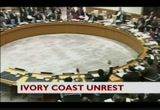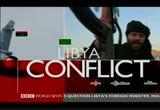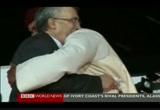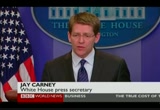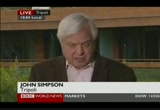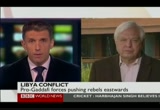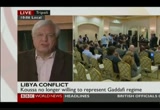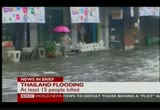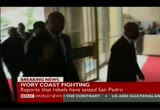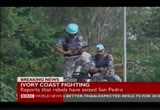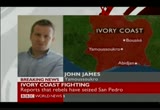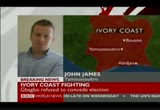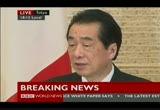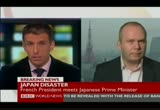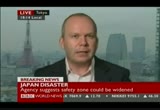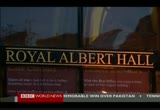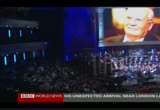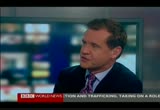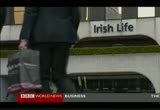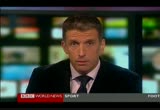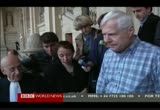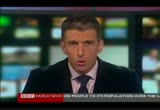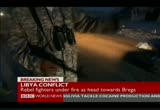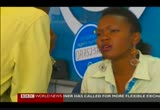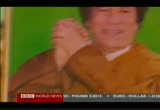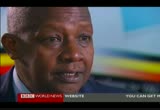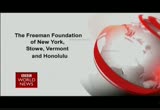tv BBC World News PBS March 31, 2011 5:00am-5:30am EDT
5:00 am
>> this is "bbc world news." funding for this presentation is made possible by the freeman foundation of new york, stowe, vermont, and honolulu. newman's own foundation. the john d. and catherine t. macarthur foundation. and union bank. >> union bank has put its financial strength to work for a wide range of companies, from small businesses to major corporations.
5:01 am
what can we do for you? >> and now, "bbc world news." >> libya's foreign minister is questioned in the u.k. as he claims he no longer wants to work for the gaddafi regime. bolstering the rebels, reports that president obama has approved covert support for the struggling libyan opposition forces. and the united nations imposes sanctions on ivory coast as fighting continues across the country. welcome to "bbc world news." i'm peter dobbie. also in the next 30 minutes -- radiation continues to seep from japan's stricken fukushima nuclear plant. and ireland awaits the results of stress tests on the banks. just how much more cash is needed to save them?
5:02 am
>> one of gaddafi's closest allies is in the u.k., saying he's no longer prepared to represent the country's regime. moussa koussa was questioned for several hours by british officials. this latest development comes as the white house has declined to comment on reports that president obama has authorized covert american support for the rebels in libya. here's humphrey hawksley. >> for years, colonel gaddafi's loyal lieutenant, moussa koussa, has been a familiar figure in tripoli during the uprising. now he's being debriefed by british officials, who hope his deep insider knowledge of the regime will bring about its early downfall. in his faltering media appearances, he blamed al qaeda
5:03 am
for the violence and the west for its colonialism and oil interests. all the time, he was in close contact with the british government. he knows many there. in 2004, tony blair and colonel gaddafi's historic meeting was arranged by mr. koussa. but he's also accused of being a mastermind of the 1988 lockerbie bombing. then in 2009, negotiating the controversial release of the convicted bomber. >> mr. moussa koussa, one of the most loyalist disciples to mr. gaddafi, and he's been there for quite long time, and i think -- i think his defection is going to be the biggest crack in gaddafi's regime so far. >> his arrival coincided with dramatic new losses for the libyan rebels. with a lull in air strikes, they've been fleeing town after town along the northern
5:04 am
coastline, pushed back by better armed and trained libyan troops. their inability to break through increases the stakes for the coalition. with reports that president obama assigned a secret order now authorizing covert operations to help the rebels. the white house would not be drawn. >> the broader question of assisting the opposition is one we're looking at very closely. we're coordinating with the opposition and exploring ways we can assist them with nonlethal assistance, and we'll look at other possibilities of assistance as we move forward. >> air strikes have stopped rebel defeat in the present military stalemate. increasing the focus on forcing the libyan regime to implode from within. the coalition wants more high-level defections. humphrey hawksley, bbc news. >> john simpson is our world affairs editor. he's in tripoli for us this
5:05 am
hour. let's just kick off by talking about president obama and that order for co-verlt action that may or may not -- covert action that may or may not have been signed in the white house. surely it's pretty surprising to think there wouldn't be special forces or c.i.a. people already on the ground somehow any place. >> surely you're right, peter. it's what i think many of us here have assumed, that american special forces, the c.i.a., britain's mi-6, the whole raft of organizations and groups must, i think, already be here. it's as vast a country, terribly easy to get people in. but to be honest, this is not the solution to the problem. the problem is that the rebel army isn't an army at all. it's got no command structure, doesn't have any offices. everything it does is down to the individual will, decisions
5:06 am
of individual fighters, and sometimes they get forward and sometimes they get back. you can't sort that out by sending in c.i.a. operatives. you can't sort that out by sending in the s.a.s. in small numbers. it's a structural problem, and they're going to have to work out a way to solve it in an altogether different fashion. >> back to mr. koussa now being debriefed by mi-5 or mi-6, does part of that equation come down to how key he was in a regime that relies on key people? >> well, moussa koussa will know various things which will be of importance to the coalition authorities. he'll know, for instance, how close the system here is is to crack him. he'll know who the people in it
5:07 am
are likely to crack. but my feeling is that not only that colonel gaddafi's people will simply shrug it off and say it's just another person, just another interior minister who surfaced in benghazi and then started to say how he hated colonel gaddafi for a long time, they can say, look, this is just individuals, it doesn't really matter, and they'll draw closer together because the group that matters and the only group that matters in this country is a small group of family members and extended family members around colonel gaddafi himself. >> john simpson live in tripoli, thanks very much. there have been calls for more protests in syria today after the president failed to announce any concessions in his first speech since anti-government demonstrations broke out there two weeks ago. protesters are reportedly planning fresh action after prayers on friday. in his speech, the syrian
5:08 am
leader said there must be reform, but he gave no time table. the nigerian president, goodluck jonathan, has appeared in a presidential debate in which he was the only speaker. his main opponents pulled out of the event after mr. jonathan should notted two previous debates, so the incumbent leader addressed the country on his own. the presidential vote is due in 10 days' time. 15 people have been killed in flooding and landslides in southern thailand. high seas have prevented ferries from operating, leaving thousands of people stranded. let's get more on one of our top stories this hour, the ongoing situation in ivory coast for you, where the u.n. security council has approved sanctions against ivory coast laurent gbagbo over his refusal to hand over power to his rival, the recognized winner of the election held last november. latest reports say forces loyal
5:09 am
have now entered the port of san pedro, which handles the country's cocoa exports. on wednesday, the administrative capital fell to mr. ouattara's fighters. >> workers gather looking for a way out of the ivory coast. forces loyal to the internationally recognized president, alassane ouattara, claimed to have seized the country's capital, while laurent gbagbo insists he won november's election and is still leader. now the u.n. security council, which has been criticized for doing little in ivory coast while authorizing air strikes to protect libya's people, has acted. it imposed a travel ban and frozen the overseas financial assets of laurent gbagbo and his inner circle. >> this is a resolution against rebel and specifically in one
5:10 am
united voice, requires gbagbo to cede power to president ouattara and to respect the will of the people. >> there are u.n. peacekeepers in ivory coast. west african states have called for their mandate to be strengthened so they could protect the people more effectively. the security council ended up calling on the peacekeepers to prevent the use of heavy weapons against civilians. >> the indians especially, because their a major contributor, and they don't want the part of the fighting, part of the civil war. >> the u.n. security council is trying to isolate gbagbo and increase the pressure on him to go, hoping he'll give up his claim to be ivory coast's president. the question is what impact this will have on the fighting 5,000 miles from here.
5:11 am
laura trevelyan, bbc news, from new york. >> the bbc's john james is on the line now from yamoussoukro. how significant is this port city? >> well, it's the key port really on the southwest corner of the country and takes about just over half of the country's cocoa exports. this is the world's biggest producer of cocoa. the key ingredient in chocolate and by far the biggest earner for the country, so it's an important site and certainly opens up now that whole region to the ouattara forces, who now just are left to take in their campaign to get rid of gbagbo. >> how much trouble is there on the streets on a day-to-day basis? >> well, i think separating out the interior of the country first and the pro-ouattara forces have moved extremely swiftly through the country, are moving down from the northern half of the country in a major offensive that started
5:12 am
on monday, and now they already control at least 80% of the territory. this is the main city, and that's where laurent gbagbo's elements still are, and that's where civilians loyal to him have been setting up barricades. there's one this morning near the presidential palace, and there, things are tense. many businesses haven't opened this morning. there's been sporadic fighting in advance of the arrival of the pro-ouattara forces. >> john, thanks very much. john james there, our correspondent in ivory coast. we're just going to show you pictures coming to us from japan, because the french president, nicolas sarkozy, has become the first world leader to visit japan following the earthquake on march 11 and the tsunami, of course, that followed it. he's following through on comments that he gave as he arrived in tokyo last night, where he said we will ask the nuclear safety authorities, a group of 20 countries to meet, if possible, in paris during the month of may to define international nuclear safety
5:13 am
standards. his commends come, significant, perhaps, as we get the new readings today, showing radiation levels are continuing to rise outside the fukushima nuclear power plant. we're talking about two chemicals, radioactive iodin oh, life of eight days, that's perceived as not dangerous. we're also talking about leaking into the ocean. that stays around and stays danger for 30 years. live now to our tokyo correspondent, chris hogg. nicolas sarkozy is in tokyo. he's where you are. his comments, i'm assuming, will be received very well. >> yes. both president sarkozy and also the prime minister, the japanese prime minister, announced their cabinet, making clear that nuclear safety will become a very important part of the g-20 meetings in may. and expressing this expression
5:14 am
by the end of the year, the u.n.'s nuclear watch dog, could come up with a new set of nuclear safety standards. the japanese prime minister said that japan had a responsibility to learn from this disaster and to tell the world what it has learned when it goes to those meetings. >> as far as france is concerned, chris, not wishing to take our eye off the ball as to what's what happens in fukushima, but france generates 75% of its electricity with nuclear power, so they want to make sure the industry worldwide continues and is ok. >> yes, that's absolutely right. and the french are moving to try to help the japanese a bit more with this, to help them with this clear offer and to try to stabilize the plant and also with this process of what lessons can be learned, but i think you're right, it is also probably with an eye to french public opinion, it's about trying to calm this and to see
5:15 am
how -- how they're already looking to how they will move on from here. what we're hearing in terms of specifics, the french saying they're going to send robots, which will be able to work within the contaminated area to help with what's going on there, and also that the french will also be -- will also be ensuring that this becomes a priority, they're saying, that now they will be addressing that summit right at the beginning of that summit, conveying, if you like, just how important this is for the g-8 and g-20 at the moment. >> chris, thanks very much. you're watching "bbc world news." still to come -- the knock-on effect, how the conflict in libya is having an impact on other countries in africa. >> film stars and past political leaders attended a concert at the royal albert hall in london last night to celebrate the 80th birthday of
5:16 am
the former soviet leader, mikhail gorbachev. in the west, he was praised for ending the cold war, but many russians still blame him for the collapse of the old soviet empire. >> a red carpet for the humble communist party bureaucrat who became the soviet union's last president. mikhail gorbachev, guest of honor at one of london's glitziest and most glamorous of gala evenings, at the royal albert hall. heavyweight politicians, including pop stars and on the part of is a singers, all anxious to play their part in his 80th birthday party. >> all the things that are happening in egypt and belarus, in iran, in libya, people are fighting for the very kind of freedoms and access and ability to cross borders that mikhail gorbachev did. >> he's the man who brought about the end of the cold war 20 years ago. many in his homeland still
5:17 am
blame him for the collapse of the soviet empire. he pursued a reform agenda, freeing dissidents, ending accept soreship, and loosening the communist party's grip on politics. he proved to be an inspiration for young people living throughout the eastern bloc. he visited east germany, the berlin wall came down, and with it, a system of government that to those young people seemed increasingly irrelevant. the royal albert hall concert was also organized to help raise money in the fight against cancer. for his celebrity, his is a legacy which includes his charity work as much as for his political career. even amongst his most fiercest critics, mikhail gorbachev will forever be known as the man who changed the world. >> this is "bbc world news." these are the top stories so
5:18 am
far this hour. the libyan foreign minister is questioned here in britain. he said he is no longer willing to work with the gaddafi regime. and the u.n. imposes sanctions on ivory coast as the strategic port of san pedro is seized by forces loyal to alassane ouattara. let's get more on japan, specifically talking about the knock-on effect of all the bad news that's going on there and the economy. >> yeah, absolutely, because what we're seeing today are the first real numbered, the first true evidence of what the disaster has caused in terms of industrial production in japan. manufacturing numbers in march, no surprise, pretty much fell off the cliff, a two-year low, the steepest month-on-month decline on record, so big problems there. the problems, of course, one of the industries you're looking at, you just saw there, the carmakers, much of the production still halted. where they've got production up and running, the big problem is the supply chain. we've been talking about this certainly for the last couple of weeks, so those components,
5:19 am
which the majority of them manufactured in the disaster-stricken zone, and they're not expected to be up and running for several months, so really having a knock-on effect, not only in japan, but this will have global implications. >> stress test on the irish banks. i thought they were discredited, because stress tests, you can interpret them to what you want to hear, so why are you placing so much emphasis on stress tests? >> well, with ireland in particular, because this is one of the peripheral eurozone economies that received a bailout, and it was pretty much on the back of the collapse of its banking system. so they really just need to see just how strong or how weak the irish banking system is. so these stress tests are likely to reveal that the irish banks need another $35 billion euros. that is around $43 billion. this is extra, mind you. they've already pumped ined 64 billion. so in all, $107 billion will be pumped into the eye rshbacking
5:20 am
system. all of the major irish banks will be under government control. before you go, i'll have more on the world business report in about 10 minutes. >> thank you. shut up. get off. talk to you later. more news on our website, bbc.com. it is a case that divided two country's legal systems. a doctor was charged after his step-daughter was murdered. the girl's biological father kidnapped him from germany to see him face justice in the french courts for the 1982 killing of the girl. >> it's one of the most celebrated legal affairs in france. a vendetta going back three decades. and now this man has finally succeeded in getting into court in paris the man he believes raped and killed his daughter. it was, he said, the moment he'd been waiting for.
5:21 am
the accused answering the charges against him. the girl died in germany after being administered an injection by a german doctor who'd become her stepfather. he says it was a terrible track deerks an attempt to relieve her anemia that went wrong, and the courts in germany agreed. there he'd been cleared of wrongdoing. but mr. mabmerski wouldn't give up, and 18 months ago, he arranged for him to be kidnapped in germany and delivered across the border into the hands of french police. now the trial will be able to go on by normal proceedings. i think whatever circumstances, i always wanted him to be present, that he expresses himself, that his lawyers defend him. >> the doctor's lawyers says
5:22 am
it's a farce. how can he be cleared in one country and then tried in another, and how can he face trial after being illegally kidnapped? but the judge ruled that the case can continue. he has finally got his way. >> over the past few hours, it's been evident that rebels are losing battle against colonel gaddafi's forces. our correspondent is just outside brager. the ebb and flow of who controls the territory, what's the latest from where you are? >> the latest is the rebel forces moved this morning heading towards brega in what initially looked like some sort of plan. they would make sure it was not flanked, and then they were slowing moving down the road. and then they suddenly came under artillery fire.
5:23 am
we saw a number of vehicles struck, which undoubtly killed them. as a result, the vehicles, which were following on in hundreds, have turned around and retreated about 10 kilometers back. so we're seeing lack of organization and heavy weapons being carried by the rebels, stopping them from actually taking on the forces. >> briefly, nick, are we now saying that the allied air campaign is no longer having an impact on colonel gaddafi's forces? >> i say what we can say. from we are, which is very much on the rebel side in central libya, there are calls for more air. they are relying on these air strikes to move forward, and quite simply, this is not happening in their eyes. >> nick, that happens very much. nick springgate, our correspondent there on the outskirts of brega. not a particularly good phone line, but we just did want to put him on the air to get the
5:24 am
latest. the conflict in libya is having an impact. gaddafi's government has invested in businesses across africa, and under u.n. sanctions, those assets will now be frozen. >> the bombs are hitting libya, but the pain is felt far, far away. on the streets of kampala, the booming mobile phone industry has been shaken. colonel gaddafi's government owns over 2/3 of uganda telecom. but now with the u.n. assets freeze, there's uncertainty and jobs are on the line. this uganda-based businessman has lost out. he was due to fly contractors for a libyan-funded petroleum pipeline to be built from kenya to rwanda. >> the crisis in libya broke, suddenly everything's on ice. now we're at the small end of it, but it's a third of a billion dollar project, which a place like uganda is really quite significant. it's not just the money that comes to us, but it's the money that feeds through to the local economy. >> it's not just east africa.
5:25 am
right across the continent, libya's oil money has been pumped into industries, including real estate, banks, and the fuel sector. not all these investments have been commercial. this grand mosque changed the skyline of kampala. it was a gift from the libyan leader to the people of you're gained a. -- to the people of uganda. despite attempts to oust him, colonel gaddafi still has some support here. >> come together, but they are after. >> do you think colonel gaddafi was and still is good for africa? >> yeah, still good, and he will remain. >> in order to gain influence in africa, colonel gaddafi built close relationships with traditional kingdoms across the continent. he even declared himself the king of kings.
5:26 am
and this is the palace he built for the toro kingdom here in the west of uganda. gifts like these gained him friends, as did his backing for some of the couldn't net's revolutionaries. gaddafi may now have lost the support of africa's governments, but many question the methods being used to get rid of him. >> for us, we are not about the regime change, no. we are about the peaceful government reforms. >> when colonel good off's money flowed, people tended to dance to his tune. if he goes, the links between the north of africa and the rest of the continent will be changed forever. will ross, bbc news, uganda. >> if you want any on all our top stories, do check out the website, bbc.com/news. more on that breaking aspect to the libya story that's come out in the past few minutes, fighting continuing.
5:27 am
our bbc correspondent on the road witnessed the lead car in the convoy being blown up. >> hello and welcome. >> see the news unfold, get the top stories from around the globe and click-to-play video reports. go to bbc.com/news to experience the in-depth, expert reporting of "bbc world news" online. >> funding was made possible by the freeman foundation of new york, stowe, vermont, and honolulu. newman's own foundation. the john d. and catherine t. macarthur foundation. and union bank.
5:28 am
>> union bank has put its global expertise to work for a wide range of companies. what can we do for you? >> bbc world news was presented by kcet los angeles. >> hi, i'm paul berry, mpt commissioner, and a life-long journalist who values the free and fair exchange of news and ideas. public television provides a daily forum for the reasoned exploration of issues that
5:29 am
187 Views
IN COLLECTIONS
WMPT (PBS) Television Archive
Television Archive  Television Archive News Search Service
Television Archive News Search Service 
Uploaded by TV Archive on

 Live Music Archive
Live Music Archive Librivox Free Audio
Librivox Free Audio Metropolitan Museum
Metropolitan Museum Cleveland Museum of Art
Cleveland Museum of Art Internet Arcade
Internet Arcade Console Living Room
Console Living Room Books to Borrow
Books to Borrow Open Library
Open Library TV News
TV News Understanding 9/11
Understanding 9/11
